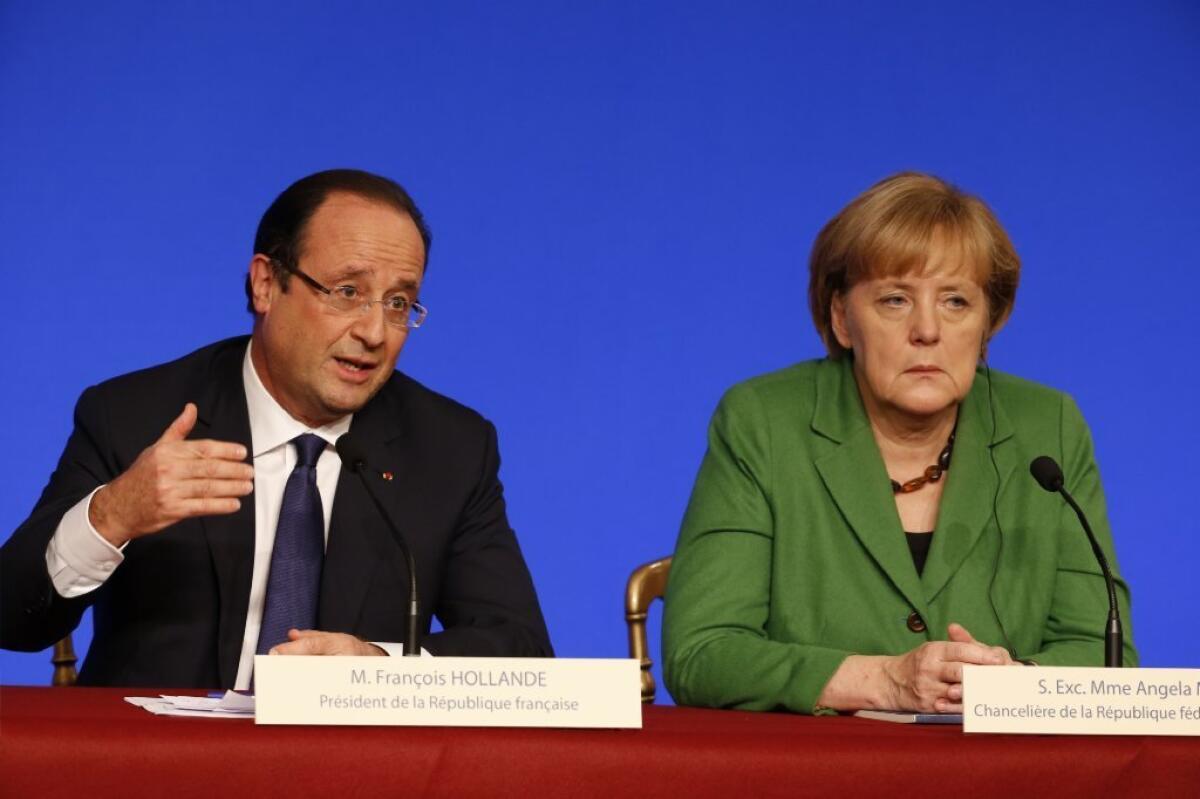Is Europe headed for divorce?

- Share via
Now that the German elections are over, Germany and France will launch a great initiative to save the European project. Marking the centennial of 1914 and World War I, this will contrast favorably with the weak and confused leadership under which Europe stumbled 100 years ago. Before the May elections to the European Union Parliament, the Franco-German duo’s decisive action and inspiring oratory will drive back the anti-EU parties that are gaining ground in so many European countries.
In your dreams, Mr. and Ms. Pro-European Union. A new German government won’t be formed until just before Christmas. In the German coalition negotiations, European affairs are being handled by — wait for it — a subgroup of the working group on finance. For the three participating parties — Angela Merkel’s Christian Democratic Union, the Bavarian Christian Social Union and the opposition Social Democrats — the hot-button issues are all domestic: the minimum wage, energy policy, dual citizenship, a proposed road toll; these things count for more than the future of the continent.
Germany’s politicians know how to sell their parties to voters in future elections, most of whom are not feeling the pinch of the euro crisis. Youth unemployment is about 8% in Germany, compared with 56% in Spain. It is hard to convey just how un-urgent the crisis of Europe feels to the man on the Berlin subway. Unlike his counterpart in Madrid, he does not emerge from the underground to find stinking garbage piling up on the streets.
Once Germany’s government is formed, its European policy will be the product of compromises between three departments of state, which will themselves be divided politically among the various parties. Europe’s reluctant leading power will have to make further compromises with France, which has different views on several key issues.
France has a weak president, Francois Hollande, who is failing to reform his own country, let alone help anyone else’s. The aging and increasingly unequal German-French couple — which marked a rather downbeat golden wedding anniversary in January, with the German wife now definitely wearing the trousers — will have to take account of the concerns of valued partners such as Poland, as well as proposals coming from European institutions.
And from this dysfunctional orchestra is to emerge a clarion call that will knock the skeptics of all countries back on their heels and mobilize Europeans to vote for Europe? Ha!
Partly as a result, the May elections will be the most interesting since direct elections to the European Parliament began in 1979. Across Europe there is an amazing array of national protest parties. “Populists” is the blanket term lazily draped over them all, but it does not capture their diversity.
With all due disrespect to Britain’s Independence Party and Germany’s anti-euro Alliance for Germany, it is quite wrong to tar them with the same brush as Greece’s neo-fascist Golden Dawn, Hungary’s Jobbik or France’s National Front. That’s even more true of, say, Catalan nationalists and Beppe Grillo’s Five Star movement in Italy, which could not be further from far-right.
Closer to the xenophobic politics of the French National Front are groupings such as the Vlaams Belang in Belgium; Finland’s the Finns (until recently, True Finns); the Danish People’s Party; and the Freedom parties in Austria and the Netherlands. Odd couple Marine Le Pen, leader of the French National Front, and Geert Wilders, of the Dutch Party for Freedom, last week performed the political equivalent of a wedding dance in The Hague.
“Today is the beginning of the liberation from the European elite, the monster in Brussels,” cried Wilders. “Patriotic parties,” added Le Pen, want “to give freedom back to our people” rather than being “forced to submit their budget to the headmistress.”
There is nothing at all coming from the current leadership in Berlin, Paris or Brussels (forget London) that is likely to reverse the tide that’s buoying these parties. Behind their typical 10% to 25% standing in opinion polls is a wider popular discontent with unemployment, austerity and a Brussels EU bureaucracy that spews out regulations about the specifications of your vacuum cleaner and how much water you can use in a toilet flush.
If the tide continues to rise, what happens?
Because the one thing most of these parties have in common is that they are nationalists, they may have difficulty agreeing on much beyond their shared dislike of the EU. If after the spring elections they are strongly represented in the European Parliament, the immediate effect will be to drive the mainstream socialists, conservatives and liberals closer together. So you’d have an explicit grand coalition in Berlin and an implicit one in Brussels.
The trouble with grand coalitions is that because mainstream, centrist parties are burdened with the responsibility of government, the field of opposition is left wide open for the protest parties. On the other hand, if the anti-parties succeed at the polls, it could at last mobilize a younger generation of Europeans to defend achievements they take for granted.
It won’t be 1914, but 100 years on, Europe will again be living in interesting times.
Timothy Garton Ash, a contributing writer to Opinion, is professor of European studies at Oxford University and the author, most recently, of “Facts Are Subversive: Political Writing From a Decade Without a Name.”
More to Read
A cure for the common opinion
Get thought-provoking perspectives with our weekly newsletter.
You may occasionally receive promotional content from the Los Angeles Times.









